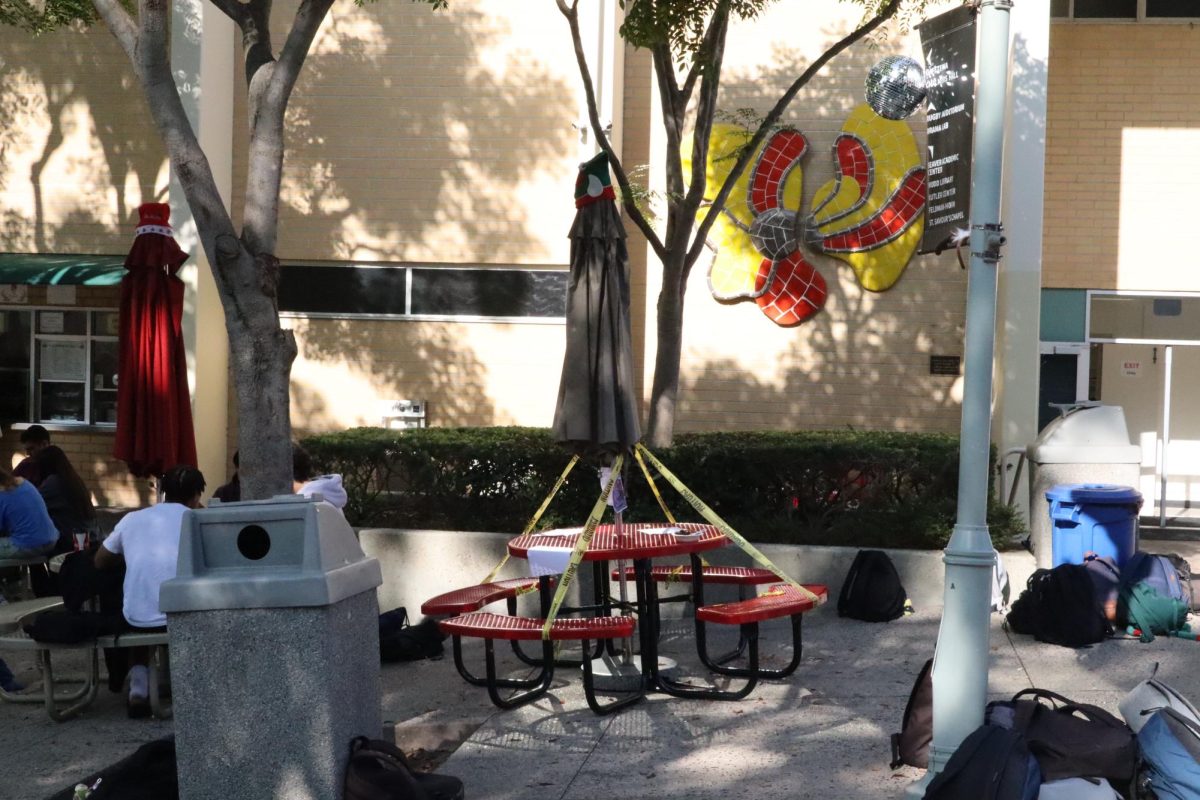Selling Our Spirit
Students discuss the commercialization of Christmas, impacting other winter holidays and emphasizing materialism.
December 14, 2022
As Jewish Club leader Charlotte Newman ’24 drove home from diving practice, she shuffled through her holiday playlist and added “Santa Baby” by Ariana Grande after seeing an Instagram Reel featuring the song. Despite Grande singing about Santa Claus and Christmas trees — staples of the Christian holiday Christmas that Newman does not celebrate — she continued to listen as the warm air of her car blew on her face, reminding her of the winter holiday season. Newman enjoys participating in holiday activities and said she attributes the prominence of Christmas during the holiday season to the Christian majority in the United States.
“It doesn’t hurt to celebrate [holiday] traditions just because the American holiday season is infused with Christmas,” Newman said. “There are so many different Christmas traditions, and Jews are a tiny piece of the population, so of course, the holiday spirit is not going to be Jewish-focused. It’s not surprising that the majority of the winter season is spent thinking about Christmas because the majority of the population is Christian.”
Newman said as a result of Christmas’s cultural prominence, the modern celebration of Hanukkah has become shaped by its Christian counterpart.
“I think Hanukkah, or the way we celebrate it in America, is probably a reaction to Christmas,” Newman said. “The way Hanukkah is celebrated with gift giving is definitely a reaction to Christmas because that’s non-traditional.”
Religiously, Hanukkah is not as significant as Christmas, with Christmas being a central holiday for Christians. In the Jewish faith, Hanukkah is a minor holiday, with Passover and the Jewish High Holy Days of Rosh Hashanah and Yom Kippur taking religious priority. Newman said while Hanukkah is not an irrelevant holiday, much of its significance in American Jewish culture is a direct result of Christmas’s hold on the holiday season. Nevertheless, Newman still emphasizes the importance of Hanukkah as a symbol of resilience.
“Hanukkah isn’t an insignificant holiday,” Newman said. “It’s about religious freedom, Jewish heritage in the land of Israel and about the Jewish people defending their land. It is an interesting holiday, but I think the reason why we consider it important is because of Christmas. I think it can be important to a lot of people, but the reasoning is a bit misplaced at times.”
Jewish Families Alliance (JFA) Junior Leader Allie Hunnius ’24 said Christmas and Hanukkah are often associated with one another due to their proximity as winter holidays.
“People think that Hanukkah is a Jewish Christmas, but it’s not,” Hunnius said. “[The two holidays] fall so close to each other, and people definitely associate them quickly with each other, so you see them become interconnected.”
Newman said although Jews have the freedom to observe holidays however they want, she feels celebrating Hanukkah in a manner that emulates Christmas decreases Jewish pride.
“I think that Judaism is more of a tradition than a religion,” Newman said. “You can choose how you want to celebrate and the amount of faith you want to exercise. When people celebrate Hanukkah in a Christmas-like way, such as having a Hanukkah bush to emulate a Christmas tree or a Mensch on the Bench to emulate an Elf on the Shelf, there’s an element of assimilation to that. I think it decreases Jewish pride by trying to Christianize your holidays.”
Hunnius performs in the school’s Jazz Band and has noticed that a large number of popular Christmas songs, such as “The Christmas Song,” “Let it Snow,” “White Christmas” and “Santa Baby,” were written by Jews. Hunnius said Jews have assimilated with American culture by writing about Christmas to find success, as songs about Jewish holidays would not have as much demand.
“The fact that so many [Christmas songs] are written by Jews is due to the fact that as a musician, you have to know what sells,” Hunnius said. “It’s a hard job to have, and Christmas music sells, so I think that it’s proof of having to acclimate to the climate that you’re in to be successful. Let’s be honest, I don’t think Jewish songs would sell as much because there’s not a large demographic looking for it, so Jewish musicians assimilated and wrote Christmas songs to be successful in a Christmas-dominated culture.”
In light of the cultural significance of Christmas, Hunnius said she only sees people celebrate Christmas in a secular and lighthearted way, rather than a purely religious manner.
“I personally don’t know anyone that celebrates Christmas in a religious manner,” Hunnius said. “I know people that celebrate Hanukkah religiously, [but with] Christmas, I only really [see] the materialistic aspects like family traditions of food and gifts.”
Though Bill Coleman ’24, a practicing Catholic, said he recognizes that many people celebrate Christmas outside of the religious aspect, he still practices the religious part of the holiday.
“I think that [Christmas] has become very secular,” Coleman said. “There’s a lot of people that celebrate that aren’t religious, and Christmas becomes a festive time of year. Personally, my family and I keep the religious aspect, and it is very important [to us]. We go to church every weekend, and during [the] Christmas season we go even more often.”
Coleman said in addition to the secular significance of Christmas, it holds great significance to him and other Catholics religiously, and the holiday season means more than just lightheartedness and fun.
“Christmas is a very big holiday in Christian and Catholic culture,” Coleman said. “While it has been a bit overhyped with this whole season being built around it, from a Catholic standpoint, it is actually very important. The season is based off the Advent for Catholics, which is four weeks leading up to Christmas, when you prepare yourself for the coming of Christ because he’s about to be born. So from that perspective, the month is actually very important.”
According to a Chronicle poll, 41.7% of 84 Jewish student respondents say they celebrate Christmas despite being Jewish. Leo Craig ’24 said he partakes in various Christmas traditions and celebrates it in a secular manner despite being Jewish.
“The aspects of Christmas we celebrate, like having a Christmas tree, opening presents on Christmas morning and having a dinner on Christmas Day, are all really secular values and don’t really interact with the religious portion of Christmas at all,” Craig said. “We personally do not observe any of the religious aspects of Christmas, and it’s just fun to celebrate and give gifts as Christmas has become a largely secularized holiday.”
Hunnius said while gift-giving during Christmas can be positive, the growing importance of that aspect has resulted in the holiday becoming solely valued for material gain.
“I do think American culture has caused [Christmas] to become more commercialized and materialistic, which honestly isn’t always negative,” Hunnius said. “Gift-giving is a love language, but I think Christmas has just been defined as a holiday about the money and material [items] rather than the holiday cheer.”
According to a Chronicle poll, 53.6% of 194 student respondents said that they view winter holidays as materialistic in nature. Math Department Head and AP Economics Teacher Kent Nealis said that materialistic aspects of Christmas have led to it becoming commercialized. However, Nealis said rather than it being a negative trend, the commercialization of Christmas has had a positive economic impact.
“Christmas is marketed as a secular holiday, as the marketing refers almost exclusively to the holiday season over the religious context,” Nealis said. “That’s understandable, as many retailers earn a disproportionate amount of their profits during the holiday season. It may be disappointing to religious [people], but it is responsible for generating a lot of economic value, which means more jobs. For example, if we look at FedEx or UPS, they hire a tremendous number of seasonal employees just for the holiday surge. So, I’m not sure that this capitalization is necessarily a bad thing.”
Nealis said the growing emphasis on the materialistic part of Christmas and the proliferation of a secular Christmas is not a new trend.
“The holidays have been commercialized, but it has been that way for a very long time,” Nealis said. “This is not a new phenomenon. There is a reference in the movie called ‘Miracle on 34th Street’ where someone is complaining about how commercialized Christmas is, and that [movie] was released in 1947. That was 75 years ago.”
Elizabeth Johnstone ’24 said Christmas has been defined in the modern day by its secular aspects, and it will continue to grow more secular as time goes on.
“Nowadays, Christmas is very commercialized with the idea of gifting and food,” Johnstone said. “Religion is still a part of it for a significant number of people, but not as much as it used to be. And I think we’re definitely seeing a trend toward more secular traditions for Christmas.”
Nealis said the holiday season not only provides financial opportunities from the increased gift exchanges but also offers opportunities for community service.
“If anything, the holidays provide us with a season where we think about others beyond ourselves and what to do for them,” Nealis said. “This is a period of time when we see all kinds of philanthropic programs that are aimed at helping the disadvantaged or underserved. If helping somebody out during the holiday season is the hook that gets you into doing it permanently, that’s great.”
Johnstone, a practicing Catholic, said despite the effects commercialization has on Christmas, she believes Christmas and the holiday season create opportunities for people to give back and serve their community.
“I identify with my religion in more of a service-based way,” Johnstone said. “I sing in the choir, I help out with confirmation sessions at my church and I volunteer to help kids prep for their sacraments. I wouldn’t say my inner faith is super strong right now, so in a sense, service is how I connect with it. There are a lot more service opportunities at my parish around Christmas, and a lot more people volunteer around those times, as it’s a good way to get into the holiday spirit.”
Though Johnston connects more with the service component of Catholicism than the faith aspect, she said her family celebrates Christmas in both a secular and religious manner.
“My household is not super religious, but Christmas is always big just because religious traditions were big for my parents when they were growing up,” Johnstone said. “So it’s really significant in our household to go to Mass on Christmas and to celebrate that, but we definitely do celebrate the secular side as well. For my family, once Mass is over, it becomes a secular holiday.”





























